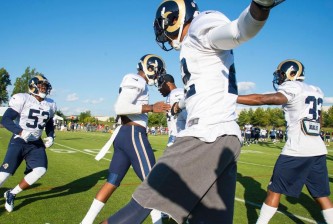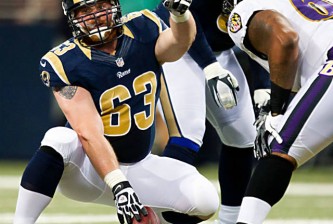The Rams enter week three and their home opener ranked dead last in ESPN’s power rankings, but first in Thesaurus entries for “shitty” used by sportswriters: “Lowly” (Yahoo Sports), “Pathetic” (Sporting News), and most infamously, “a shambles” (Marc Schlereth). And that’s just in the last 24 hours.
Do they deserve this vitriol? Hell no! (Unless it’s coming from one of us, goddammit!) Is it going to stop? Not until they win. Will it happen this week? Let’s revisit our preseason prediction for the Rams’ matchup versus the Packers, and apply what we’ve learned.
| Week | Date | Opponent | LY: Record | LY: Points | 3Y: Record | 3Y: Points |
| 3 | Sept. 27 | vs. Green Bay Packers | 6-10 | 419/380 | 27-21 | 1155/1037 |
| Rams games vs opponent, last three seasons: | ||||||
| Week 5, 2006: Won 37-31 at home Week 15, 2007: Lost 33-14 at home |
||||||
At the time, we wrote:
A lot of people will look at last year’s Packers team and their unimpressive 6-10 record, and the relatively unproven Aaron Rodgers, and simply conclude that this team isn’t very good. However, the Packers may have been the single-most unlucky team of the season, if you compare their ability to outscore opponents (+39, 6th best in the NFC) with their record.
At the root of their terrible luck? An 0-7 record in games decided by four points or less. If you want to argue that such a team “hasn’t learned how to win,” evidence suggests that teams like this pick it up pretty damn quickly. Here’s a quote from FO’s analysis:
Of these two teams, the 1995-96 Panthers (assuming those are the teams FO meant to cite) are an interesting comparison, as they became the fastest expansion team to reach the playoffs. Their improvement hinged partially on the rapid maturation of their young quarterback, Kerry Collins. Aaron Rodgers’s performance last season was actually far better than even Collins’ second-year heroics: more touchdowns, higher completion percentage, higher quarterback rating. So he isn’t the problem.
However, the Panthers’ immediate legitimacy and eventual run to the playoffs was fueled primarily by coach Dom Capers’ stifling defense, which ranked second in the league in points allowed in 1996 — a staggering achievement for a second-year team.
Now Capers has been hired to transform the Packers’ defense, and he is doing so by loudly insisting on a switch to the 3-4. Capers has had an immediate positive impact on nearly every defense he’s coached. However, as Adam Burnett of the Packing Cheese blog points out, the success of this switch depends largely on Aaron Kampman.
What does this mean for the Rams? You have two teams in transition, defensively. However, one is working with a talent base that was +39 in points scored last season, while the other was an execrable -233. I’d give the nod to the Packers here, in a 28-20 Green Bay win that should feature some eye-popping offensive plays mixed in with some impressive defensive efforts on both sides.
After two games, the rule against the Packers’ evolving 3-4 defense appears to be simple — if you can run the ball, you can beat this team. The Chicago Bears, victims of a 21-15 loss that didn’t seem as close as the score suggests in week 1, haven’t been able to run all season behind Orlando Pace and their geriatric offensive line. (Matt Forte: 2.2 yards per carry. Ouch.) And thus, Al Harris and the Packers intercepted Jay Cutler four times, introducing Chicago to the Jay Cutler face.
But the (lowly, pathetic, team-in-a-shambles) Cincinnati Bengals were able to dominate the line of scrimmage, without their #1 pick offensive lineman, and spring Chicago castoff Cedric Benson for 141 yards behind a punishing 29 carry-workload. This softened up the injury-weakened secondary, forcing them closer to the line of scrimmage, providing room for Carson Palmer to make big-play throws. The Bengals put up 21 points in the first half, after scoring only 7 the week before against a pretty middling Denver Broncos team.
Now obviously, running the ball is only half the equation here, and the Rams receivers, other than Laurent Robinson, must work harder to get separation and get open quickly, to give the Rams the same chance that the Bengals took advantage of.
On the flip side of the line, the Packers’ offensive line is “a mess” with the loss of Chad Clifton, and the continuing presence of human turnstiles Daryn Colledge and Allen Barbre. The National Football Post calls this game a “one-week crash course” to prepare for divisional foe Jared Allen and the Vikings. It is also perhaps the most vulnerable line the Rams will have played thus far, and the ideal time for Steve Spagnuolo’s defensive line to step up and assert themselves.
Ultimately, I can’t back off my original prediction, because for each vulnerability the Packers have shown in weeks 1-2 — a weakened secondary and a devastated offensive line — the Rams have equal question marks with their receivers and defensive line. The safe pick is that both teams will score points, but again, the talent factor will weigh in with someone like Greg Jennings scoring the decisive points.
However, there is room for optimism here. This is no slam-dunk for the Packers, and the Rams should be energized to play well for the home crowd — and to try and stifle the traveling cheesehead caravan. In one major sign of improvement, the Rams have come out and are playing very well defensively in the first quarters of play. If the offense can wake up early offensively as well, the team could build some early momentum and ride it to their first win of the season.






















